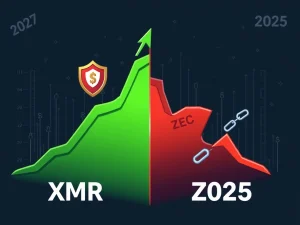Urgent Crypto Market Crash: Decoding Today’s Shock Downturn and Bitcoin Price Plunge

Feeling the chill in the crypto air? If your portfolio is looking a little less green today, you’re not alone. The cryptocurrency market is experiencing a significant downturn, leaving many investors wondering, Why is the crypto market down today? Let’s dive deep into the factors triggering this market dip and what it means for your crypto holdings.
What’s Behind Today’s Crypto Market Crash?
The crypto sphere, known for its rollercoaster rides, is currently on a downward slope. On April 7th, the total crypto market capitalization witnessed a sharp decline, plummeting by 10% to $2.41 trillion at its lowest point. This crypto market crash isn’t just another blip; it’s fueled by a confluence of global economic anxieties and specific market dynamics. Let’s break down the key culprits:
- Escalating US-Led Trade War: President Trump’s firm stance on newly imposed tariffs has ignited fears of a full-blown trade war. These tariffs, affecting multiple countries, have injected uncertainty into global markets, prompting a risk-off sentiment among investors.
- Global Recession Worries: The trade war intensifies concerns about a looming global recession. Investors are increasingly worried that these economic tensions could stifle growth and trigger a widespread economic downturn.
- Equities Market Sell-Off: The traditional equities market is also experiencing selling pressure, mirroring the crypto market’s movements. This synchronized downturn suggests a broader risk aversion across different asset classes.
- Historically Large Liquidations: The crypto market saw massive liquidations exceeding $1.4 billion in the last 24 hours. These liquidations, primarily of long positions, exacerbate the downward pressure on prices and create a ripple effect of fear and further selling.
The confluence of these factors has created a perfect storm, leading to the current crypto market crash.
Bitcoin Price Plunge: End of Decoupling?
Bitcoin, often seen as a bellwether for the broader crypto market, has taken a significant hit. The Bitcoin price tumbled to as low as $74,434 on Bitstamp, a level not seen since November 2024. This decline signals a potential end to Bitcoin’s recent decoupling from traditional markets, as it now appears to be reacting to the same global economic pressures.
Ether (ETH) followed suit, experiencing substantial losses and dipping to around $1,400. Other major cryptocurrencies like XRP, Solana (SOL), and BNB also witnessed significant double-digit percentage drops. This widespread decline across the top cryptocurrencies underscores the severity and breadth of the current market downturn.
Inflation Fears and Interest Rate Cut Speculations
Adding fuel to the fire are renewed fears of inflation. The imposed tariffs are expected to drive up prices, potentially leading to what hedge funder Bill Ackman termed an “economic nuclear war.” This inflationary pressure is causing market participants to reassess their expectations for Federal Reserve policy.
Interestingly, the market is now increasingly anticipating potential interest rate cuts by the Federal Reserve. The odds of a 25 basis point rate decrease have surged to 42%, compared to just 14% a week prior. This shift in expectations reflects the market’s concern about economic slowdown and potential recessionary pressures.
| Factor | Impact on Crypto Market |
|---|---|
| US-Led Trade War | Increased economic uncertainty, risk-off sentiment |
| Recession Fears | Investor anxiety, reduced investment in risk assets |
| Equities Sell-Off | Broader market risk aversion, synchronized downturn |
| Liquidations | Exacerbated price drops, increased selling pressure |
| Inflation Fears | Economic instability, potential Fed policy shifts |
Massive Liquidations: A Web3 Echo of Past Crashes?
The scale of liquidations during this downturn is staggering. Over $1.4 billion in crypto positions were liquidated in just 24 hours, with a significant $1.22 billion being long positions. This ranks as one of the largest liquidation events in Web3 history, drawing parallels to the Covid-19 market crash and the FTX collapse. Such events not only trigger immediate price drops but also inject fear into the market, potentially leading to a self-perpetuating cycle of selling pressure.
More than 460,000 traders faced liquidation, with individual liquidations reaching as high as $7 million. This widespread impact underscores the intensity of the market correction and the risks associated with leveraged trading in the volatile crypto market.
Market Capitalization Wiped Out: How Deep is the Crypto Dip?
The total market capitalization of cryptocurrencies has taken a significant hit. From a high of $2.67 trillion on April 5th, it plummeted by over 13% to an intraday low of $2.31 trillion on April 7th. This translates to a staggering $350 billion being wiped off the cryptocurrency market in just three days. While the market has shown some signs of recovery, currently sitting at $2.4 trillion, it remains significantly below its recent highs and is down 35% from its all-time peak in December 2023.
Navigating the Downturn: What’s Next for the Crypto Market?
The current market analysis suggests that the crypto market is facing headwinds from global economic uncertainties and risk aversion. The US-led trade war and fears of recession are likely to continue influencing investor sentiment and potentially exert further downward pressure on crypto prices. While market volatility is inherent in the crypto space, understanding the underlying factors driving these downturns is crucial for making informed investment decisions.
Key Takeaways:
- The crypto market is down due to a combination of factors including trade war tensions and recession fears.
- Bitcoin and other major cryptocurrencies have experienced significant price drops.
- Massive liquidations have amplified the market downturn.
- Inflation concerns and potential interest rate cuts are adding to market complexity.
Disclaimer: This analysis is for informational purposes only and should not be considered financial advice. Investing in cryptocurrencies involves substantial risk, and you should conduct your own thorough research before making any investment decisions.









